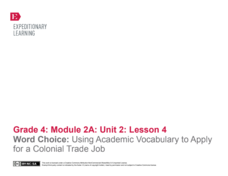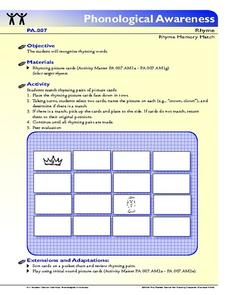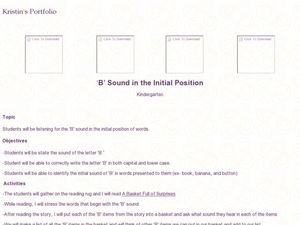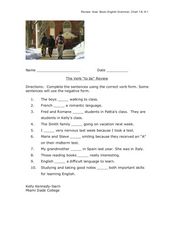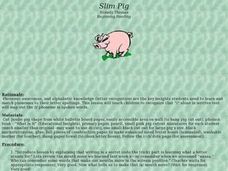EngageNY
End of Unit Assessment: Presentation of Position
What is the difference between formal and informal language? Pupils rewrite their position speeches to adapt them for an audience of adults. Next, they present their speeches in small groups, attempting to answer the question, "Which...
Curated OER
Introduce Vocabulary: Alexander, Who Use to be Rich Last Sunday (Viorst)
Although this vocabulary-in-context activity is focused on Judith Viorst's book Alexander, Who Use to Be Rich Last Sunday, the strategy can be applied to any book budding learners read with you. First, introduce the three...
Curated OER
Troublesome Word Pairs
This worksheet helps to understand when to use commonly confused words. It includes definitions, writing exercises, and questions that require paraphrasing the meaning of sentences. A good exercise for middle schoolers, or review for...
Curated OER
Connotation and Denotation: How Word Choice Affects a Paragraph
Review the terms denotation, connotation, diction, and mood in paragraph writing. After defining the terms, middle schoolers practice writing examples of both connotation and denotation. They complete a connotation and denotation...
EngageNY
Word Choice: Using Academic Vocabulary to Apply for a Colonial Trade Job
Scholars reflect upon colonial jobs such as a blacksmith, cooper, shoemaker, etc. Together, the class writes a job application as a practice for working independently. Learners employ their experience in writing a job application for a...
Curated OER
Inside, Outside, and Between
In this preposition worksheet, students review the concepts inside, outside, and between in pictures and sentences. Students practice writing the three prepositions on primary lined paper.
Curated OER
Analyzing Folklore: Redwall
Brian Jacques’ novel Redwall provides the focus for a series of lessons involving the analysis of folklore. Adopting the persona of a character, groups write letters in the voice of their character, assemble a collage using Microsoft...
Curated OER
Setting the Tone with Figurative Language
Explore figurative language with your secondary class. Extending a language arts unit, the lesson plan prompts middle schoolers to examine how an author's word choice establishes a story's tone, possibly using metaphors, similes,...
Florida Center for Reading Research
Phonological Awareness: Rhyme, Rhyme Memory Match
Young scholars play a memory-matching game to practice recognizing rhyming words and sounds. With picture cards, they flip over two cards and say the pictures' names. If the pair make a rhyming match, the learner keeps the cards. The...
Virginia Department of Education
Developing an Essay: Word Choice
Grading essays after reading a novel written by a lyrical master (think Nabokov, Morrison, Chabon) is a deflating experience. Why can’t your student’s display the same skill in diction as your favorite writers? Because you did not use...
Murrieta Valley Unified School District
Review and Assess: “The Inn of Lost Time”
Check out a resource made up of two separate exercises. The first page lists a series of higher-level questions about "The Inn of Lost Time" by Lensey Namoika. Use the questions to encourage discussion or as an assessment. Since they...
Reed Novel Studies
The Secret Garden: Novel Study
Mary from The Secret Garden finds a key that could possibly unlock the door to a secret garden. Scholars read Frances Hodgson Burnett's class novel and match vocabulary words with definitions, answer comprehension...
Curated OER
B Sound in the Initial Position
Students listen for letter sounds. For this phonics lesson, students read A Basket Full of Surprises, brainstorm items that start with the B sound, and complete a comprehension activity where they identify words with and without B...
Curated OER
Verb "to be" Review
In this recognizing positive and negative be verbs instructional activity, students complete sentences using the correct verb form. Students write 10 be verbs.
Houghton Mifflin Harcourt
Nature Walk: English Language Development Lessons (Theme 2)
Walking in nature is the theme of a unit designed to support English language development lessons. Scholars look, write, speak, and move to explore topics such as camping, woodland animals, instruments,...
Curriculum Corner
Guest Teacher Plans (Grade 2)
Be prepared the next time you're in need of a substitute with a daily plan equipped with an assortment of activities covering subjects math, reading, word work, writing, and science.
Curated OER
Using a Computer to Write a Letter: Verbs
Review the procedure of using a word processor to write a letter. Writers read 20 sentences that are each missing one action verb. They use the words in the word bank to complete the sentences.
Curated OER
Slim Pig
Beginning readers study the short /i/ sound. First they determine how the mouth moves when they say the target words in a tongue twister. They complete letterbox activities by making words with the short /i/ before reading What Is It and...
Curated OER
Using a Computer to Write a Letter: Verbs (Sequencing)
Review sequencing by providing your English language learners with this mix of sentences. Cut the paper into 20 strips, and have each learner rearrange them into the correct order. Don't forget to keep one copy with the correct order!
Civil War Trust
Civil War Personalities Lesson Plan
Caring, trustworthiness, and responsibility—these are only a few character traits in focus of a lesson based on stories from the Civil War era. Class members explore several influential lives while reading biographies that highlight...
Curated OER
On and Off Concepts
In this preposition learning exercise, learners review on and off by viewing pictures and reading context clues in sentences. Students practice writing the two words on primary lined paper.
Curated OER
Past Perfect Simple-Positive Sentences
In this past perfect simple tense activity, students use words and phrases given to form positive sentences in the tense. Answers may be submitted online for review. ESL appropriate but not exclusive.
Curated OER
Avoiding Double Negatives
What double negatives are, and how to avoid using them, is the focus of this language arts worksheet. After a review of what double negatives are, students address 15 problems that have to do with double negatives.
Curated OER
Home Spelling Practice Review Unit 5
In this spelling review worksheet, 1st graders read the four lists of short a and short e words and play a Clues game. Students complete 2 activities.




